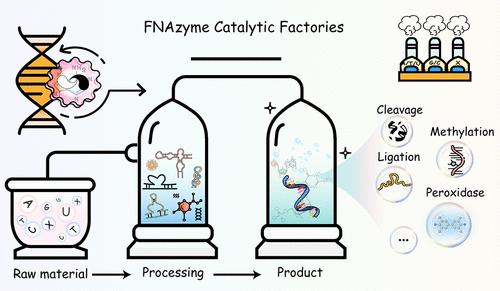Functional Nucleic Acid Enzymes: Nucleic Acid-Based Catalytic Factories
IF 11.3
1区 化学
Q1 CHEMISTRY, PHYSICAL
引用次数: 0
Abstract
Biocatalysis plays a vital role in the operations of all living organisms, which is usually thought to be mediated by protein enzymes. However, the pioneering discovery of self-splicing intron-splicing RNA ribozyme demonstrated that nucleic acids can also promote catalysis, with efficiency comparable to that of proteases. The discovery of deoxyribozyme (DNAzymes) further broadened the understanding of the catalytic function of nucleic acids. Since then, nucleic acids with various catalytic functions have been gradually discovered and significant efforts have been devoted to the applications studies of nucleic acid catalyst. Consequently, a systematically and comprehensive review is needed to summarize all the advancements in the FNAzymes field. In this review, we propose the concept of functional nucleic acid enzymes (FNAzymes). FNAzymes are nucleic acids or nucleic acid complexes with special structure and catalytic functions. Then FNAzymes are divided into four groups based on the components that make them up: ribozymes, DNAzymes, modified FNAzymes, and functional nucleic acid nanozymes (FNA nanozymes). In addition, the catalytic function, structure, and catalytic mechanism of each FNAzymes are introduced. The applications of FNAzymes in biosensing, bioimaging, and biotherapy of are summarized. Finally, future development trends and application prospects of functional nucleases are discussed.

功能性核酸酶:基于核酸的催化工厂
生物催化作用在所有生物体的运作中发挥着至关重要的作用,人们通常认为这种作用是由蛋白酶介导的。然而,内含子自拼接 RNA 核酶的开创性发现表明,核酸也能促进催化作用,其效率可与蛋白酶相媲美。脱氧核糖核酸酶(DNA 酶)的发现进一步拓宽了人们对核酸催化功能的认识。此后,人们逐渐发现了具有各种催化功能的核酸,并致力于核酸催化剂的应用研究。因此,需要一篇系统全面的综述来总结 FNAzymes 领域的所有进展。在这篇综述中,我们提出了功能核酸酶(FNAzymes)的概念。功能核酸酶是具有特殊结构和催化功能的核酸或核酸复合物。根据其组成成分,FNAzymes 可分为四类:核糖核酸酶(ribozymes)、脱氧核糖核酸酶(DNAzymes)、修饰的 FNAzymes 和功能核酸纳米酶(FNA nanozymes)。此外,还介绍了每种 FNAzymes 的催化功能、结构和催化机理。总结了 FNAzymes 在生物传感、生物成像和生物治疗方面的应用。最后,讨论了功能核酸酶的未来发展趋势和应用前景。
本文章由计算机程序翻译,如有差异,请以英文原文为准。
求助全文
约1分钟内获得全文
求助全文
来源期刊

ACS Catalysis
CHEMISTRY, PHYSICAL-
CiteScore
20.80
自引率
6.20%
发文量
1253
审稿时长
1.5 months
期刊介绍:
ACS Catalysis is an esteemed journal that publishes original research in the fields of heterogeneous catalysis, molecular catalysis, and biocatalysis. It offers broad coverage across diverse areas such as life sciences, organometallics and synthesis, photochemistry and electrochemistry, drug discovery and synthesis, materials science, environmental protection, polymer discovery and synthesis, and energy and fuels.
The scope of the journal is to showcase innovative work in various aspects of catalysis. This includes new reactions and novel synthetic approaches utilizing known catalysts, the discovery or modification of new catalysts, elucidation of catalytic mechanisms through cutting-edge investigations, practical enhancements of existing processes, as well as conceptual advances in the field. Contributions to ACS Catalysis can encompass both experimental and theoretical research focused on catalytic molecules, macromolecules, and materials that exhibit catalytic turnover.
 求助内容:
求助内容: 应助结果提醒方式:
应助结果提醒方式:


